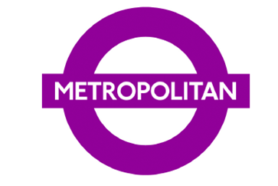Was it the end of the line for TfL's Metropolitan trade mark?
Could this be an encouragement to keep arguments simple? In Metropolitan Spain v TfL, the Opposition Division exercised its entitlement to focus only on the most effective rights and grounds.


On 20th June 2018, Transport for London (TfL) filed an EU trade mark (EUTM) application for a figurative mark for a variety of goods including luggage, bags, wallets, carriers and articles for animals in class 18, and clothing in class 25.
This application was opposed by Metropolitan Spain S.L. under Article 8(1)(b) and Article 8(5) EUTMR relying on earlier registrations for:
- an EUTM registration for a figurative mark in classes 41 and 44;
- a Spanish trade mark registration for the word mark METROPOLITAN in classes 39, 41 and 44; and
- a Spanish trade mark registration for the word mark MET SHOP in class 35.
Global assessment in detail
Carrying out a global assessment of the likelihood for confusion between the marks, the Opposition Division (OD) rejected Metropolitan Spain’s case under Article 8(1)(b).
Similarity of the goods and services

The OD noted that Metropolitan Spain’s figurative EUTM registration and its Spanish trade mark registration for METROPOLITAN in classes 39, 41 and 44 covered travel arrangement services, education, training, entertainment, sporting and cultural activities and beauty care. It found these services to be dissimilar to the goods applied for.
The parties’ respective goods and services had different methods of use and were neither in competition nor complementary. The fact that some of the earlier services, such as sporting activities, might involve the use of some of the opposed goods was not enough to find similarity between them.
As such, Metropolitan Spain could not rely on these registrations to support its case under Article 8(1)(b) EUTMR.
However, the OD found that some of the goods applied for were similar to Metropolitan Spain’s wholesale and retail services of the opposed goods protected under its Spanish trade mark registration for MET SHOP in class 35. For reasons of procedural economy, the OD assumed the goods applied for to be identical to the services covered by the MET SHOP mark.
For reasons of procedural economy, the Opposition Division assumed the goods applied for to be identical to the services covered by Metropolitan Spain’s MET SHOP mark.
Relevant public
The OD noted that the goods and services assumed to be identical were directed at the public at large and the professional public, with an average degree of attention. The relevant territory in this case was Spain.
Comparison of the marks
The OD noted that the earlier mark was composed of two verbal elements: MET and SHOP. The element MET had no meaning. The word SHOP would be understood as referring to a building for the retail sale of goods and services. The verbal element SHOP was descriptive and non-distinctive in relation to the “wholesale and retail services online and in shops” protected by the earlier mark.
The mark applied for consisted of the distinctive verbal element METROPOLITAN (which was similar to the Spanish word “metropolitan”). This was understood by the relevant public as denoting a metropolis or large city.
The opposed mark also included a figurative element consisting of a purple rectangle placed across a purple circle. Because the public are more likely refer to a mark by its verbal element, the verbal component was found to be more distinctive than this figurative one.
Visually, the marks were considered similar to a low degree.
Aurally, the OD considered that the marks differed in rhythm and intonation because they were composed of different syllables and were of different lengths.
Conceptually, the OD found the marks to be dissimilar. The earlier mark had no meaning other than the descriptive element SHOP, which itself could not indicate commercial origin.
Overall, the OD found the similarities between the marks insufficient to counteract the aural and conceptual differences.
Distinctiveness of the earlier mark
Finally, as Metropolitan Spain did not explicitly claim that its mark was distinctive by virtue of intensive use or reputation, the distinctiveness of the earlier mark had to be seen as normal.
Considering all the above, the OD found no likelihood of confusion on the part of the public.
The impact of local reputation
The evidence showed that the mark METROPOLITAN had been subject to long-standing and intensive use and was generally known in the relevant market, Spain. Metropolitan Spain demonstrated a reputation in relation to services in classes 41 and 44, including sports training and beauty care services. Accordingly, the examination of the marks focused on the Spanish-speaking part of the public.
Again invoking the concept of procedural economy, the OD focused its analysis on Metropolitan Spain’s earlier figurative trade mark registration and disregarded the other marks relied upon.
“The OD focused its analysis on Metropolitan Spain’s earlier figurative trade mark registration and disregarded the other marks relied upon.”
The common verbal element of the marks, METROPOLITAN, was similar to the Spanish word “metropolitan” and understood by the relevant public as denoting a metropolis or large city. It was also distinctive in respect of the goods and services concerned.
By contrast, the verbal elements of the earlier mark (SPORT CLUB & SPA) were understood by the relevant public to indicate a place where people go to exercise or receive spa treatments and descriptive and non-distinctive in relation to the services concerned.
In both cases, the verbal elements of the marks were more distinctive than the figurative elements. As the marks coincided in the distinctive verbal element, the marks were found to be visually and aurally similar to a high degree. The marks were also found to be conceptually highly similar.
Risk of injury
Metropolitan Spain claimed that use of the opposed mark by TfL would take unfair advantage of, and be detrimental to, the distinctive character or the repute of its earlier trade mark.
The OD had already established a link given the similarities between the marks, the goods and services and the fact that the earlier mark has a high reputation in the EU (in particular, Spain) for sports training and beauty care services.
In Spain, the opposed mark benefitted from an immediate degree of recognition due an association with the earlier mark.
As such, the opposed mark benefited from an immediate degree of recognition due an association with the earlier mark, even without investing significantly into promotion and marketing. The OD concluded that the opposed mark was likely to take unfair advantage of the distinctive character or the repute of the earlier trade mark in relation to the opposed goods.
Citing reasons of procedural economy once more and having already found the existence of an unfair advantage, the OD did not examine other risks of injury.
The OD partially upheld the opposition, namely, in respect of all the goods in class 25 and in respect of all goods in class 18 except for those related to animals and pets, to which Metropolitan Spain’s reputation did not extend.
The opposition under Article 8(5) EUTMR was also based on its trade mark registration for the word mark METROPOLITAN. As this mark covered a narrower range of services and the outcome of the case could not be different with respect to the goods for which the opposition had already been rejected, the OD did not carry out an analysis in respect of this mark.
The OD exercises its entitlement
Metropolitan Spain relied on a number of earlier rights and two causes of action. However, the sole purpose of opposition proceedings is to decide whether an application may proceed. In doing so, the OD is under no obligation to examine all earlier rights and legal grounds invoked. It can choose the most effective earlier rights and grounds.
Here the OD focused on those marks it considered most similar and with the broadest goods and services. As it was perfectly entitled to do, it also focused on a particular area of the EU, Spain.
The strong evidence of local reputation that Metropolitan Spain was able to produce, therefore, led to success.
Key points:
- Reputation in one EU country may be sufficient to find trade mark infringement under Article 8(5) EUTMR.
- The EUIPO is not obliged to consider all earlier rights and legal grounds relied upon by an opponent.
Désirée Fields is a Legal Director at DLA Piper UK LLP
Read more case comments
Is that coffee from Iceland?
An EU General Court decision reinforces the barriers to registering country names as EU trade marks, writes David Birchall. T-105/23, Iceland Foods Ltd v EUIPO, General Court.
Uneven footing
Post-sale circumstances can be considered when assessing similarity and likelihood of confusion, writes Leanne Gulliver. [2025] UKSC 25, Iconix Luxembourg Holdings SARL v Dream Pairs Europe Inc & Anor.
A bad beginning makes a bad ending
A trade mark registered in bad faith may be challenged without any time limit, writes Eve Duggan. C-322/24, Sánchez Romero Carvajal Jabugo SAU v Embutidos Monells SA, CJEU, Eighth Chamber.
Notting Hill-gate
Failure to deal with IP before a corporate restructure led to handbags at dawn over the use of a logo, says Chris Morris. [2025] EWHC 1793 (IPEC), Courtnay-Smith & Anor v The Notting Hill Shopping Bag Company Ltd & Ors.
Not so easy
Rose Smalley-Gordon reviews two conflicting High Court decisions, resolved on appeal. [2025] EWCA Civ 946, easyGroup Ltd v Easy Live (Services) Ltd & Ors; [2025] EWCA Civ 1000, easyGroup Ltd v easyfundraising Ltd & Ors.
Not a valid replacement
A prosthetic-knee-joint maker filed EU trade marks to extend an expired patent in bad faith, reports Geoff Weller. C-17/24, CeramTec GmbH v Coorstek Bioceramics LLC, CJEU.







